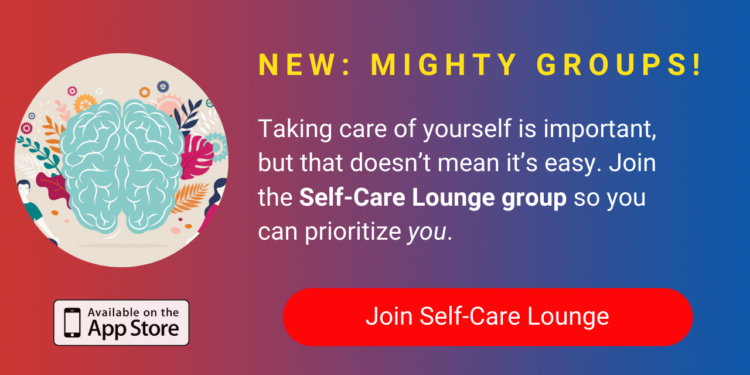How I'm Learning Feelings Aren't 'Bad' as Someone With Borderline Personality Disorder
Being human and experiencing the full spectrum of complex human emotions can be overwhelming. Still, I believe feeling those emotions is better than not at all. This week, my therapist reminded me it’s OK to feel disappointed by the people you love. Disappointment does not equal hate and does not result in punishment.
I’ve lived with symptoms of borderline personality disorder (BPD) for most of my life. Some of the things that means for me include experiencing black-and-white thinking and having an intense fear of abandonment. I’m sure many can relate to some extent. Have you ever thought about situations or viewed people as only good or bad — no in-between? What about being afraid you will ruin some of the most important relationships in your life? If any of that resonates, keep reading on friend. It’s a struggle, and recently I was faced with my ways of thinking, and when I tell you I was distressed …whew.
Alright, now it’s time for one of my anecdotes.
Interpersonal relationships and processing what I am calling, complex human emotions, have always been challenging for me. But recently, I have been focusing on nurturing relationships that are important to me — some long-lasting and some that have just begun budding. One day, I experienced immense disappointment: Sudden canceled plans and feeling misunderstood by someone close to me. I felt so distressed and annoyed that it threw me off the whole day. In turn, I put my phone on silent while simmering in my annoyance.
The annoyance faded and the next day I was met with panic. I felt that because I didn’t answer certain calls, I was “acting out.” I began stressing every second a text went unanswered and I felt I was being punished. Then, I felt bad for feeling and that I was now facing retaliation. After all, I thought I ruined my friendships and I was the one to blame.
The distress lasted for two whole days. I had no idea what to do, so I chose to silently struggle and endure the anxiety I felt I brought onto myself.
When I explained all of this to my therapist, I completely broke down. I didn’t understand why I was so upset or who I was upset with. I was so afraid everything was going to come crashing down. She offered simple, but life-altering words. She told me my feelings of disappointment were valid. Anyone would be disappointed from canceled plans and feeling misunderstood. Which made me question, then why do I feel like it’s the end of the world?
There’s a lot there. For starters, let’s revisit some terms I mentioned earlier:
1. Black-and-white thinking.
This is when one sees people/situations as either all good or all bad, no in-between. It is hard to imagine both the good and the bad existing as a whole. I think the “textbook example” in regards to BPD is idealizing someone so much that you put them on a pedestal and believe they can do no wrong. Then, something happens and you may hate them and cannot imagine the infatuation you had.
2. Fear of abandonment.
This is often developed in early childhood, when one is afraid of people leaving. A person with this fear will do anything in their power (positive or negative) to prevent being abandoned, real or imaginary.
So, when I experienced disappointment and annoyance in my friends, I felt guilty and bad for thinking anything ill of people I cared about. To me, that made me a “bad” person. And because I felt I was a “bad” person, I was afraid and began anticipating I would lose these relationships. This led to me overcompensating and apologizing over and over. These themes have echoed throughout my life. These are ways I’ve been conditioned to think through my various experiences.
I am not sure when I stopped giving myself permission to feel. But I’m so fearful in many of my relationships of messing everything up. I am relearning that being human is so complex. We experience a range of complex feelings even with those who we love so dearly. But that doesn’t mean we love them any less or that they love us any less. Each of us has the capacity to feel these complex feelings and each of us should. 
Only recently have I come to the resolve that the way my brain thinks and processes is not “wrong.” As someone diagnosed with BPD symptoms, I believe my brain is the way it is as a defense mechanism. My goal isn’t to cure the way I think, but to learn to understand my brain and create alternative ways to live a happier life. One way to live happily is to break from and unlearn unhealthy thought patterns.
Ultimately, I view emotions as a “bad” thing. So, how does one begin to unlearn this?
1. Give yourself permission to feel all of your emotions, you are human and it is your right.
2. Each day, awake and strive to leave the past in the past. The past is the past and has no relation to the present.
3. Practice deep breathing exercises/meditation. My mind is always going a mile a second, from one worry onto the next. Practicing daily meditation has helped me slow down and be more aware of my emotions.
4. Ask for help. It is a blessing and I am fortunate to have people in my life who understand and let me know they may not answer a text when they have something going on. Reassurance isn’t childish or selfish, regardless of what anyone says.
5. Challenge your negative thoughts by seeing if there is legitimate/qualitative evidence to your fears.
So, next time you are feeling fearful of your emotions, stop to ask yourself why. To be alive is to experience complex human emotions! Understanding why you think a certain way is gaining awareness. Through awareness, you grow. Learning it’s OK to experience a mix of emotions makes me feel more human and helps me not be so hard on myself.
A version of this story was originally published on Sailor Moods.
Unsplash image by Nick Owuor

